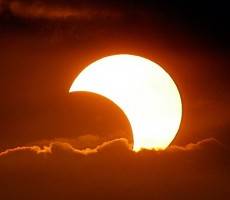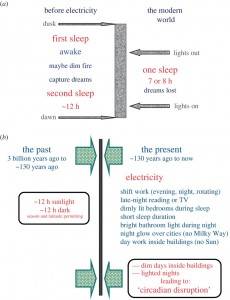March 23, 2015
How artificial light affects our health in more ways than we think
 Life on Earth has developed over the course of billions of years to attune its cycles and rhythms to the fixed routines of light and dark. Yet the modern world counters this hardwired biology in humans and radically increases our likelihood of developing a range of physiological and mental illnesses and conditions. That is the main conclusion of a new paper from Richard G. Stevens and Yong Zhu published by the Royal Society last week. The article outlines how inadequate light during the day, especially inside buildings, coupled with overexposure to artificial light in the evening not only disrupts our sleep patterns but alters our physiognomy at a metabolic, hormonal and even genetic level. The report also highlights how this can account for ‘a portion of the modern pandemics of breast and prostate cancers, obesity, diabetes and depression’.
Life on Earth has developed over the course of billions of years to attune its cycles and rhythms to the fixed routines of light and dark. Yet the modern world counters this hardwired biology in humans and radically increases our likelihood of developing a range of physiological and mental illnesses and conditions. That is the main conclusion of a new paper from Richard G. Stevens and Yong Zhu published by the Royal Society last week. The article outlines how inadequate light during the day, especially inside buildings, coupled with overexposure to artificial light in the evening not only disrupts our sleep patterns but alters our physiognomy at a metabolic, hormonal and even genetic level. The report also highlights how this can account for ‘a portion of the modern pandemics of breast and prostate cancers, obesity, diabetes and depression’.
 One of the most important conclusions posited by the article is that while there is a great deal of focus on sleep deprivation in modern ideas about wellness and health, there is still too little understood or accepted about artificial light and the need for us to have dark at night. “The importance of sleep has finally entered mainstream thinking and practice,” write the authors. “However, the importance of dark is still greatly underappreciated. Without dark, sleep is difficult and compromised. Without dark, circadian rhythmicity, as reflected in nocturnal melatonin production, is disrupted. Both sleep disruption and circadian disruption have been shown to have profound effects on physiology. Absence of dark at night can lead to both, which may then have negative effects on long-term health in a vast array of maladies.”
One of the most important conclusions posited by the article is that while there is a great deal of focus on sleep deprivation in modern ideas about wellness and health, there is still too little understood or accepted about artificial light and the need for us to have dark at night. “The importance of sleep has finally entered mainstream thinking and practice,” write the authors. “However, the importance of dark is still greatly underappreciated. Without dark, sleep is difficult and compromised. Without dark, circadian rhythmicity, as reflected in nocturnal melatonin production, is disrupted. Both sleep disruption and circadian disruption have been shown to have profound effects on physiology. Absence of dark at night can lead to both, which may then have negative effects on long-term health in a vast array of maladies.”
The problems are likely to be exacerbated by the replacement of incandescent light fittings with LED and compact fluorescent lighting, not to mention the fact that so many of us work late into the evening and just before we go to bed.











